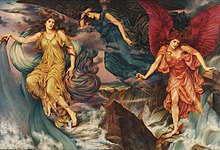De Morgan Foundation
This article has multiple issues. Please help improve it or discuss these issues on the talk page. (Learn how and when to remove these messages)
|
| Legal status | Registered charity |
|---|---|
| Headquarters | Watts Gallery Artist's Village |
| Location | |
| Website | www |
The De Morgan Foundation is a charity registered with The Charity Commission For England And Wales, Registered Charity No. 310004.[1]
The charitable objects of the Foundation are to safeguard, maintain and make available to the public the De Morgan Collection of paintings, ceramics, and other works of art made by Evelyn De Morgan and by William De Morgan and his associates, and other works of art in the collection, and to promote the appreciation of art and education in art and allied subjects.[2]
Governance
The sole Trustee of the charity The De Morgan Foundation is The De Morgan Trustee Company Limited, Company Number: 06914254.[3] The Foundation is managed by the Board of Directors of the Trustee Company.
The De Morgan Collection is owned by the De Morgan Foundation which enables public access to the works through a programme of loans and exhibitions as well as providing an online catalogue of works.
William and Evelyn De Morgan

The collection comprises work by the late 19th and early 20th century ceramicist William De Morgan[4] and his artist wife Evelyn De Morgan.[5] They were both highly regarded in their fields and William De Morgan was a potter of the Arts & Crafts Movement, credited with the rediscovery of the art of lustre. His work was influenced by the Islamic tiles he saw at the South Kensington Museum.[6][7][8]
History

The collection was formed by Evelyn De Morgan’s sister, Mrs. Wilhelmina Stirling, a supporter of the ideals of the Pre-Raphaelite Brotherhood, who also wrote several books under the name A.M.W. Stirling. She inherited some pieces from her sister and brother-in-law and actively sought out other works to add to her collection, which she displayed at her home, Old Battersea House.
Upon her death in 1965 she bequeathed her substantial art collection to be looked after in Trust. In the years following her death parts of the collection were displayed at a number of locations including Cardiff Castle, Cragside in Northumberland and Knightshayes Court in Devon, all of which have interiors from the years when the De Morgans were active. From 2002 until 28 June 2014, it was housed at the De Morgan Centre in the Victorian era Longstaff Reading Room of the former Wandsworth Library at West Hill in Wandsworth, in south west London, which dates from 1887.[9]
The De Morgan Collection

The De Morgan collection comprises 58 oil paintings by Evelyn De Morgan, ranging in style from classicism, Pre-Raphaelite[10] and Symbolism, and in scale from the domestic and intimate to extremely large canvases. Evelyn De Morgan was also a prolific draughtswoman and the collection contains over eight hundred drawings which vary from compositional sketches and life drawings to highly finished pastel studies for her oil paintings. It includes a few watercolours and unframed works by Evelyn, and some works on paper and canvas by William De Morgan.

The collection also comprises over 700 ceramics by William De Morgan, including 50 tile panels and 420 individual tiles, and 260 plates, chargers, vases, bottles, and bowls, etc. It also includes examples painted by De Morgan's top three decorators, Joe Juster and Charles and Fred Passenger, and several pieces of De Morgan's "moonlight" colour way, which are exceedingly rare.
In addition, the collection includes a small archive of material, including a collection of letters, drawings, plays, personal effects and family documents relating to William and Evelyn De Morgan. The vast majority of the archive, however, pertains to Mrs Stirling herself and includes acquisition details for the collection, her research for various books, photographs and ephemera dating from the 18th century to 1965.
Both William (1839-1917) and Evelyn (1855-1919) De Morgan were artists when they married in 1887, and in addition to their art they became involved in many of the leading issues of the day including the suffrage movement, prison reform, pacifism, and spiritualism.
The De Morgan Collection was previously on display at the De Morgan Centre until it closed in June 2014. The De Morgan Foundation has since entered into a number of long term collaborations with other institutions, and artworks from the De Morgan Collection are presently on display at Cannon Hall [11] in Barnsley in the exhibition 'A Family of Artists', in the Malthouse Gallery at Wightwick Manor in Wolverhampton in the exhibition 'A Better More Beautiful World', at the Watts Gallery in Compton,[12] and at the Ashmolean Museum in Oxford.
References
- ^ "Charity Commission". Retrieved 4 February 2017.
- ^ "Companies House". Memorandum & Articles. Retrieved 4 February 2017.[dead link]
- ^ "Companies House". Retrieved 4 February 2017.
- ^ Phelps, William Lyon (March 1917). "William De Morgan". North American Review: 440–446.
- ^ Smith, Elise (2002). Evelyn Pickering De Morgan and the Allegorical Body. Madison, NJ: Fairleigh Dickinson University Press. ISBN 978-0-8386-3883-5.
- ^ "The De Morgans". Retrieved 4 February 2017.
- ^ "William De Morgan". Retrieved 4 February 2017.
- ^ "Evelyn De Morgan". Retrieved 4 February 2017.
- ^ "Mrs A.M.W. Stirling". Retrieved 4 February 2017.
- ^ Rachel S. Gear, ‘Morgan, (Mary) Evelyn De (1855–1919)’, Oxford Dictionary of National Biography, Oxford University Press, 2004; online edn, May 2006 accessed 7 March 2015
- ^ "De Morgan Collection at Cannon Hall".
- ^ "De Morgan Collection at the Watts Gallery". Retrieved 4 February 2017.
Further reading
Stirling, A. M. W. (1922). William De Morgan and His Wife. New York: Henry Holt and Company. ISBN 1-112-26408-6.
De Morgan works
- Postman's Park
- Memorial to Heroic Self Sacrifice - Postman's Park
- Leighton House Museum
- Cannon Hall
- Ashmolean Museum
- Watts Gallery
